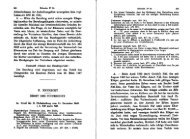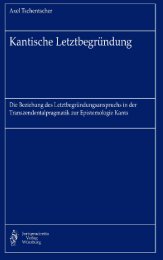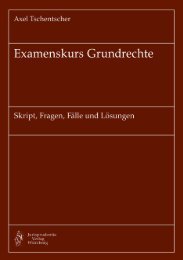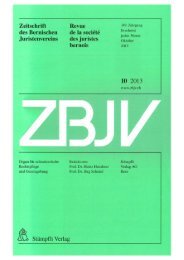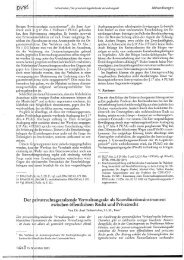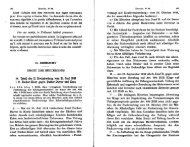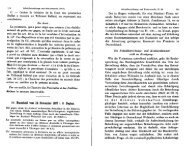Prozedurale Theorien der Gerechtigkeit - servat.unibe.ch
Prozedurale Theorien der Gerechtigkeit - servat.unibe.ch
Prozedurale Theorien der Gerechtigkeit - servat.unibe.ch
Sie wollen auch ein ePaper? Erhöhen Sie die Reichweite Ihrer Titel.
YUMPU macht aus Druck-PDFs automatisch weboptimierte ePaper, die Google liebt.
und identifiziert seine <strong>Gere<strong>ch</strong>tigkeit</strong>stheorie sogar ausdrückli<strong>ch</strong> mit <strong>Theorien</strong> rationalen<br />
Ents<strong>ch</strong>eidens 254 .<br />
Obwohl Rawls mit <strong>der</strong> Maximin-Regel auf die Ents<strong>ch</strong>eidungstheorie zurückgreift,<br />
wird seine <strong>Gere<strong>ch</strong>tigkeit</strong>stheorie do<strong>ch</strong> keine Ents<strong>ch</strong>eidungstheorie <strong>der</strong> <strong>Gere<strong>ch</strong>tigkeit</strong>.<br />
Als sol<strong>ch</strong>e müßte sie <strong>Gere<strong>ch</strong>tigkeit</strong>snormen genau dann für ri<strong>ch</strong>tig halten, wenn diese<br />
das Ergebnis eines rationalen Ents<strong>ch</strong>eidungsverfahrens sein können (D 4RC ). Do<strong>ch</strong><br />
bei aller Betonung des rationalen Ents<strong>ch</strong>eidens 255 handelt es si<strong>ch</strong> bei Rawls Prinzipienfindung<br />
eben ni<strong>ch</strong>t um eine rationale Wahl. Denn das in <strong>der</strong> Maximin-Regel liegende<br />
Ents<strong>ch</strong>eidungselement verliert bei näherer Betra<strong>ch</strong>tung seine Radikalität als<br />
individuelle Nutzenmaximierung dadur<strong>ch</strong>, daß Rawls die Wahl bewußt in eine<br />
(hypothetis<strong>ch</strong>e und kontrafaktis<strong>ch</strong>e) Situation verlagert, in <strong>der</strong> dur<strong>ch</strong> gemeinsame<br />
Unkenntnis <strong>der</strong> Parteien ein Zustand von Freiheit und Glei<strong>ch</strong>heit bereits vorgezei<strong>ch</strong>net<br />
ist 256 . Rawls setzt, an<strong>der</strong>s als Gauthier, gerade ni<strong>ch</strong>t praktis<strong>ch</strong>e Vernunft<br />
mit rationaler Ents<strong>ch</strong>eidung glei<strong>ch</strong> 257 . Seine Vernunftkonzeption ist diejenige <strong>der</strong><br />
kantis<strong>ch</strong>en Tradition, ni<strong>ch</strong>t die des Ents<strong>ch</strong>eidungsrationalismus 258 . Ganz unabhängig<br />
von <strong>der</strong> Tatsa<strong>ch</strong>e, daß die Anwendbarkeit <strong>der</strong> Maximin-Regel überzeugend wi<strong>der</strong>legt<br />
259 und au<strong>ch</strong> von Rawls na<strong>ch</strong> anfängli<strong>ch</strong>en Rettungsversu<strong>ch</strong>en 260 aufgegeben<br />
254 J. Rawls, Theory of Justice (1971), § 3, S. 16: »[W]e have to ascertain whi<strong>ch</strong> principles it would be<br />
rational to adopt given the contractual situation. This connects the theory of justice with the theory<br />
of rational <strong>ch</strong>oice.« Zum Wi<strong>der</strong>ruf dieses 'Fehlers' siehe <strong>der</strong>s., Political Liberalism (1993), S. 53<br />
mit Fn. 7: »[T]his is simply incorrect. What should have been said is that the account of the parties,<br />
and of their reasoning, uses the theory of rational decision, though only in an intuitive way.«<br />
255 Vgl. etwa J. Rawls, Theory of Justice (1971), § 3, S. 13: »One feature of justice as fairness is to think<br />
of the parties in the initial situation as rational and mutually disinterested. This does not mean<br />
that the parties are [only interested] in wealth, prestige, and domination. But they are conceived<br />
as not taking an interest in one another's interests.«<br />
256 Dieser Effekt des 'S<strong>ch</strong>leiers des Ni<strong>ch</strong>twissens' (veil of ignorance) ist beabsi<strong>ch</strong>tigt; J. Rawls, Theory of<br />
Justice (1971), § 3, S. 11: »Rather, the guiding idea is that the principles of justice for the basic<br />
structure of society are the object of the original agreement. They are principles that free and rational<br />
persons concerned to further their own interests would accept in an initial position of equality<br />
as defining the fundamental terms of their association.«<br />
257 J. Rawls, Political Liberalism (1993), S. 51 f.: »They [Gauthier and others] think that if the reasonable<br />
can be <strong>der</strong>ived from the rational, that is, if some definite principles of justice can be <strong>der</strong>ived from<br />
the preferences, or decisions, or agreements of merely rational agents in suitably specified circumstances,<br />
then the reasonable is at last put on a firm basis. ... Justice as fairness rejects this idea.«<br />
258 So letztli<strong>ch</strong> au<strong>ch</strong> J. Rawls, Political Liberalism (1993), S. 53 mit Fn. 7: »This theory ... tries to give<br />
account of reasonable principles of justice. There is no thought of <strong>der</strong>iving those principles from<br />
the concept of rationality as the sole normative concept. I believe that the text of Theory as a whole<br />
supports this interpretation.« (Hervorhebung bei Rawls).<br />
259 Maßgebli<strong>ch</strong> dur<strong>ch</strong> J.C. Harsanyi, Maximin Principle (1975), S. 595 ff. (595): »If you took the maximin<br />
principle seriously then you could not ever cross a street (after all, you might be hit by a car)<br />
... If anybody really acted this way he would soon end up in a mental institution...«. Grundlegende<br />
Kritik an <strong>der</strong> Anwendbarkeit <strong>der</strong> Maximin-Regel au<strong>ch</strong> bei J. Fishkin, Justice and Rationality<br />
(1975), S. 618, 627 f.; zusammenfassend P. Koller, Neue <strong>Theorien</strong> des Sozialkontrakts (1987), S. 93<br />
ff.<br />
260 J. Rawls, Some Reasons for the Maximin Criterion (1974), S. 142: »[T]he maximin criterion is not<br />
meant to apply to small-scale situations ... Maximin is a macro not a micro principle.« Zur Wi<strong>der</strong>legung<br />
dieses Einwandes siehe J.C. Harsanyi, Maximin Principle (1975), S. 605.<br />
182


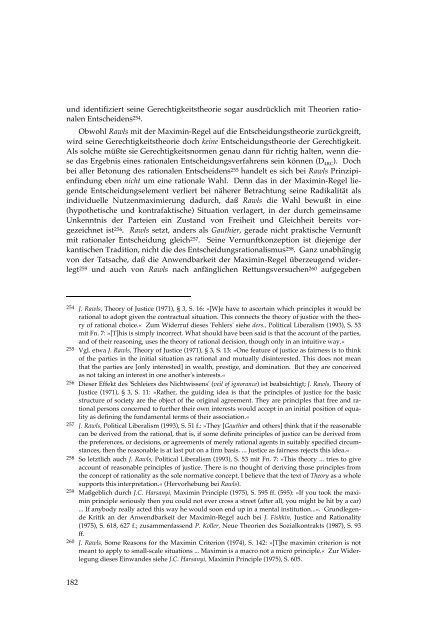
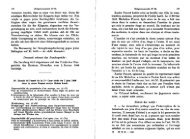
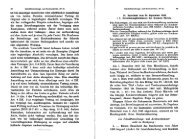
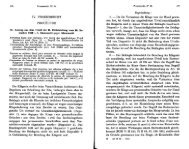
![Seminararbeit [Masterarbeit] - servat.unibe.ch - Universität Bern](https://img.yumpu.com/26241815/1/184x260/seminararbeit-masterarbeit-servatunibech-universitat-bern.jpg?quality=85)
